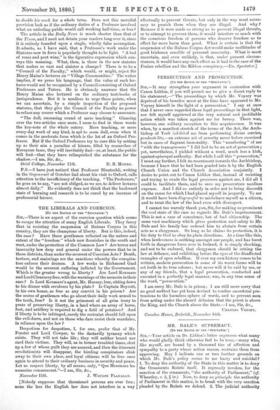THE LIBERALS AND COERCION.
[To THE EDITOR OF THE " SPECTATOR."] Sts., —There is an aspect of the coercion question which seems to escape the attention of many English Liberals. They fancy that in resisting the suspension of Habeas Corpus in this country, they are the champions of liberty. But is this, indeed, the case ? Have these gentlemen reflected on the nature and extent of the " freedom " which now flourishes in the south and west, ender the protection of the Common Law ? Are terror and insecurity less deep and general under the powers that be in those districts, than under the severest of Coercion Acts ? Death, torture, and maimings are the sanctions whereby the conspira- tors enforce their decrees. A few weeks in Richmond Gaol would be the severest suffering inflicted by the Government. Which is the greater wrong to liberty ? Are Lord Kenmare and Lord Cloncurxy free, with the warnings of the assassin in their ears P Is Lord Kenmare's agent, Mr. Hussey, free, sitting down to his dinner with revolvers by his plate ? Is Captain Boycott, in his own house, as free as any convict in his prison? Are the scores of gentlemen who go about their daily work armed to the teeth, free ? Is it not the grimmest of all grim irony to prate of preserving liberty, in a land where an array of horse, foot, and artillery is required to dig a field of potatoes ? And if liberty is to be infringed, surely the restraint should fall upon the evil-doers, and not on those who dare resist their mandates, in reliance upon the law ?
Despotism for despotism, I, for one, prefer that of Mr. Forster and Lord Cowper, to the dastardly tyranny which exists. They will not take life ; they will neither brand nor card their victims. They will, as in former troubled times, shut up a few of whose guilt they are assured, and then the itinerant revolutionists will disappear, the hireling conspirators slink away to their own place, and loyal citizens will be free once again to attend to their ordinary business in security and peace. Let us respect liberty, by all means, only, " Que Messieurs les assassins commencent."—I am, Sir, &c., [Nobody supposes that threatened persons are ever free; atone the less the English law does not interfere in a way
effectually to prevent threats, but only in the way most neces- sary to punish them when they are illegal. And why P Because if it were made so strong as to prevent illegal threats, or to attempt to prevent them, it would interfere so much with the conscious freedom of persons who deserve freedom as to effect far more harm than good. What is certain is that the suspension of the Habeas Corpus Act would make multitudes of good Irishmen sensible of personal insecurity. What is most uncertain, and even unlikely, is that, under present circum- stances, it would have any such effect as it had in the case of the Fenian rebellion and the Ribbon conspiracy.—ED. Spectator.]






































 Previous page
Previous page